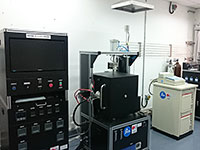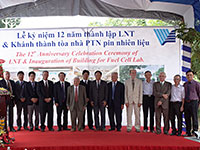Science and Technology Research Partnership for Sustainable Development (SATREPS)
Project URL:http://www.jst.go.jp/global/english/kadai/h2602_vietnam.html
Vietnam’s rapid economic growth has resulted in two big issues - the environmental pollution due to increase in organic wastes and the unstable supply of electricity.
International Research Center for Hydrogen Energy of Kyushu University (Project leader: Dr. Yusuke Shiratori) has proposed the utilization of local bio-wastes in the Mekong Delta, such as sludge from shrimp culture and agricultural residues, for power generation. This may contribute to Vietnam’s sustainable development.
On April 2015, the Japan Science and Technology Agency (JST) and the Japan International Cooperation Agency (JICA) adopted the 5-year project of “Sustainable Development of Rural Area by Effective Utilization of Bio-wastes with Highly Efficient Fuel Cell Technology” within the framework of the Science and Technology Research Partnership for Sustainable Development (SATREPS), in co-operation with the Institute for Nanotechnology (INT) of Vietnam National University-Ho Chi Minh City (VNU-HCM).
The project selected a shrimp farm in the Mekong Delta region where stable power supply is needed as a demonstration site of a fuel cell-incorporated energy circulation system. Sludge accumulated at the shrimp pond and bagasse collected from a local sugar factory are supplied to a methane fermentation reactor to produce biogas. The biogas is used as fuel to generate electricity with solid oxide fuel cell (SOFC) technology having twice the efficiency of heat engine systems. The green electricity is used for the shrimp culture such as aeration to the shrimp pond.
Vietnam’s first SOFC laboratory, in which various evaluation systems required for fuel cell R&D such as electrochemical testing machines and high-resolution scanning electron microscope were equipped with the support of SATREPS, was built at INT, VNU-HCM.
The new SOFC lab will function as an international research hub for the realization of a low carbon society, where interdisciplinary studies will be implemented by multinational researchers, engineers and students to create future international collaborations.
- -This is an English translation of NEWS 4 in TOPICS, which was published in the December 2016 issue of JST news.
http://www.jst.go.jp/pr/jst-news/pdf/2016_12/2016_12_p14-15.pdf

The evaluation systems for fuel cell R&D installed at the fuel cell research laboratory

Inauguration ceremony of the fuel cell research laboratory
JST, an integrated organization of science and technology in Japan, establishes an infrastructure for the entire process from the creation of knowledge to the return to the society. For more information, visit http://www.jst.go.jp/EN/